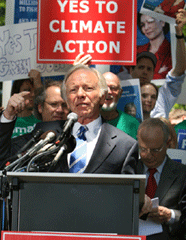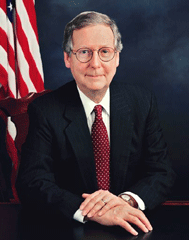Global Warming Gridlock
Air Date: Week of June 6, 2008

Senator Joe Lieberman helped draft the climate bill. (Courtesy of the National Wildlife Federation)
An historic bill to cut the country’s greenhouse gases finally reached the Senate floor, only to fall victim to a filibuster. Living on Earth’s Jeff Young explains how Washington hot air stopped the global warming bill.
Transcript
GELLERMAN: From the Jennifer and Ted Stanley Studios in Somerville, Massachusetts, this is Living on Earth. I’m Bruce Gellerman, in for Steve Curwood.
Call it global warming gridlock. Finally, an historic bill to reduce the greenhouse gases causing global climate change reached the floor of the U.S. Senate, only to fall victim to another form of hot air, the filibuster. Our Washington correspondent Jeff Young watched it go down. Hi, Jeff.
YOUNG: Hi Bruce.
GELLERMAN: The heart of this bill as I understand it, was the cap and trade approach, right?
YOUNG: That’s right. Cap and trade in a nutshell is—you set an overall limit on emissions, that’s your cap, then you let companies buy and sell emissions credits, and that’s the trade. The goal here was cutting greenhouse gases by about 65 percent by the middle of the century.
GELLERMAN: Hmm. And the bill was proposed by Senators Joe Lieberman and Republican John Warner.
YOUNG: That’s right. So you had a Republican, Warner; and independent, Lieberman; and the Democratic leadership behind this. However, it faced very tough opposition and even if it did pass, President Bush said he’d veto it. So there weren’t a lot of people expecting this to become law. However, we did expect to at least hear a serious, substantial debate on this. Instead, we heard this:

Senator Barbara Boxer speaking for Congressional action on climate change. (Courtesy of the National Wildlife Federation)
GELLERMAN: (laughing) Jeff, what’s that?
YOUNG: That’s one of the clerks of the Senate reading the bill word for word. Republican leader Senator Mitch McConnell ignored the normal protocol and insisted that the whole bill be read aloud—all 490, or so, pages of it.
GELLERMAN: Oh the poor clerk. How long did that take, Jeff?
YOUNG: About nine hours. Yeah, we were passing the hat here to buy the poor clerk some throat lozenges. But seriously, this was a form of obstruction by the Republican leaders in the Senate that filibustered the bill. Democrats did not have the votes to break the filibuster. And Democrats who supported it were understandably pretty upset. Here’s John Kerry of Massachusetts.
KERRY: This deserves a better debate. And it’s really sad that the world’s greatest deliberative body has been reduced to tricks and gimmicks and parliamentary games, rather than an honest debate on the future of our country and the future of this issue.
GELLERMAN: Hmm. Jeff, what did Republican leaders say was the reason for blocking this?
YOUNG: Well they disagreed with Democrats on how to proceed with debate. There was even a completely unrelated fight about judges. But, you know, bottom line here, Senator McConnell, the Republican leader, opposes a mandatory cap on greenhouse gases. And he and other Republicans, they just kept hammering the Democrats on one point, energy costs.
MCCONNELL: We’re amazed that they’re calling this bill up at this particular time. I mean it’s a stunning thing to behold. With gas prices being the number one issue in America they bring up a bill that objective analysis concludes is gonna raise gas taxes 53 cents.

Senator Mitch McConnell. (Courtesy of Mitch McConell)
YOUNG: There are economic models that predict that, but what Sen. McConnell conveniently leaves out is the time frame for that prediction—it’s a 53 cent increase by the year 2030. So that breaks down to about two cents a gallon a year.
GELLERMAN: Well it’s gone up a buck just in the past few months.
YOUNG: Well, that’s exactly the pushback from the Democrats who favor this bill. And they say, look, this bill is gonna invest, more in fuel efficient cars and alternative fuels so in the long run we’re gonna end up using less oil.
GELLERMAN: I’m a little confused here, Jeff, because John McCain, the Republican nominee for president, he supports this idea of using cap and trade right?
YOUNG: He had not yet endorsed this bill just yet, but McCain is a very strong supporter of this kind of action on global warming, yes.
GELLERMAN: So wouldn’t you have had Republicans against Republicans on this issue?
YOUNG: Indeed you would have. And I asked McConnell about that.
MCCONNELL: Well, I think Senator McCain can speak for himself; we’re here to speak for us.
YOUNG: And uh, so here I think we’re getting to the real reason the debate was cut short. This is very divisive for Republicans. It’s also divisive for some Democrats. You got a lot of coal state Democrats who would prefer this just kind of go away. So on the surface you had this partisan bickering, but if you look just a little deeper you see, wait a minute, this really isn't about what party they’re from, it’s about which state they’re from.

Senator Joe Lieberman helped draft the climate bill. (Courtesy of the National Wildlife Federation)
YOUNG: I spoke with Kent Conrad, and he’s a Democrat from North Dakota—there’s a state with a lot of coal, oil, gas. He opposed the bill, but he was looking forward to the debate to see, you know, what kind of global warming action can he support. Because, you know, everybody knows, this is going to be back next year—all the presidential candidates pledged to act on this. And Conrad used a baseball metaphor.
CONRAD: This is a time to test out ideas, it’s a time to negotiate, to talk about things that are needed to improve this approach. So I see this as spring training for next year. And, spring training is important.
YOUNG: Can I carry your spring training analogy a step further: next year come the real season, are you on the roster?
CONRAD: Ha ha. I never negotiate in public. Ha ha.
GELLERMAN: (laughs) What about the Republicans—not the leadership but the rank and file members—where are they on this?
YOUNG: You know, it’s very interesting. There’s a lot of change afoot. I got some time with Senator Bob Corker, Republican from Tennessee—you know, we just heard earlier the Republican leader McConnell saying, uh you can’t talk about this when gas prices are so high. Well here’s how Corker sees it.
CORKER: A lot of my colleagues would say that this is the wrong time to be talking about legislation of this type because gasoline is at four dollars a gallon. I think this is the perfect time to be talking about it.
GELLERMAN: Doesn’t sound like he’s toeing the party line there, Jeff.
YOUNG: Not at all. But, you know, sadly we’re not going to hear the kind of debate that Senators like Corker and Conrad wanted to have on important matters. You know, what to do about coal? How about nuclear power? How do you deal with competition from China? Things like that.
GELLERMAN: So Jeff, is that it for climate change in Congress this year, you think?
YOUNG: It’s probably it for the Senate. But things are just getting cooking over in the House. Democrat Ed Markey of Massachusetts has introduced a very aggressive climate change bill. It’s a challenge to other House Democrats to get moving on this. We’ll have hearings later this month in the House on climate change, and we’ll see what happens.
GELLERMAN: Well, thank you very much, Jeff. I really appreciate it.
YOUNG: You’re welcome, Bruce.
GELLERMAN: Living on Earth’s Washington correspondent Jeff Young.
|
**WEB EXTRA** LIEBERMAN WARNER BILL VOTE ANALYSIS by LOE Washington Correspondent Jeff Young - The Republican-led filibuster meant the Climate Security Act by Senators Barbara Boxer (D-CA), Joe Lieberman (I-CN), and John Warner (R-VA), never reached a full debate or final vote. There are, however, very interesting things to learn here, especially in the vote to try to break the filibuster. It takes three-fifths of the Senate to end a filibuster (officially called a cloture vote). The final vote on this bill was 48 for and 36 against, far short of the magic number of 60. However, six absent Senators (including presidential candidates Barack Obama (D-IL) and John McCain (R-AZ) sent letters for the record indicating that if present they would have voted for the bill. That allowed the bill’s proponents to claim 54 supporters—the first time a majority of the Senate has gone on record in support of specific action on climate change. Here’s how the vote broke down: It was a partisan vote except for the following Senators who crossed party lines. These Democrats voted NO (against ending the filibuster): Sherrod Brown (OH), Byron Dorgan (ND), Mary Landrieu (LA), and Tim Johnson (SD). These Republicans voted YES (to end the filibuster): Susan Collins (ME), Elizabeth Dole (NC), Mel Martinez (FL), Gordon Smith (OR), John Sununu (NH),Olympia Snowe (ME) and, of course Sen. Warner. (Republicans McCain and Norm Coleman (MN) were not present but indicated they would have voted to end the filibuster). Now, the savvy political observer will look to those politicians who face tough reelection contests. That’s where you will find how an issue is really playing.Republicans Collins, Coleman, Dole, Smith and Sununu all face reelection and all voted for action on climate change. Clearly, they feel it’s important to show their constituents they will act on global warming even if it means defying their party leadership. Democrats Johnson and Landrieu are also in tight races and voted against the bill, presumably out of concern for the energy interests in their states. Aside from domestic politics, the vote also sends an international signal. Developing nations like China now see that a majority of the U.S. Senate and presidential candidates from both parties favor specific action on global warming. This may well impact upcoming rounds of international talks. The funds that were raised at the Blue Auction will be used directly to benefit three marine conservation programs in Indonesia: The Marine Empowerment Initiative, The Marine Enforcement Initiative and The Marine Conservation Education Initiative.
Links
|





